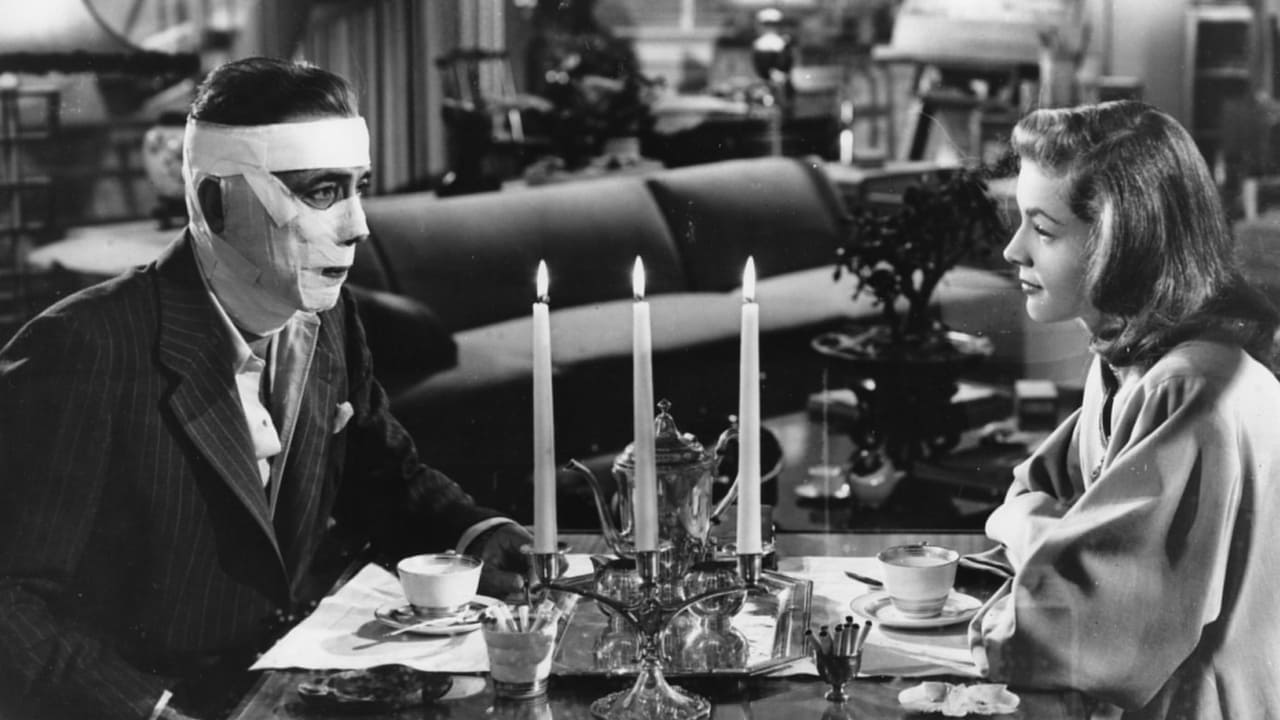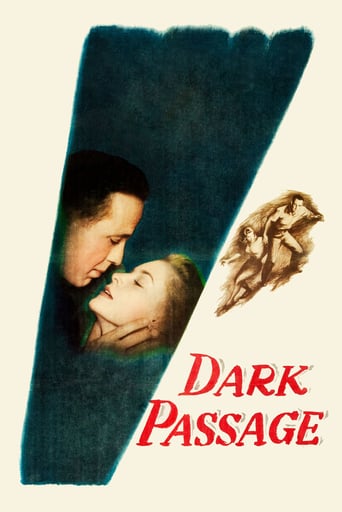

I love Bogey and Becall, but this is, by far, their weakest collaboration. The whole film felt disjointed to me. None of the characters' motivations made much sense and the "mystery" of the plot was too thin and uninterested.Bogart is Vincent, wrongly convicted of murdering his wife. He's recently escaped and needs to prove his innocence. Bacall is Irene, a woman who helps him for the very thinnest of reasons. Agnes Moorehead (Bewitched) is Madge, a former lover of Vincent's who is also a friend of Irene's. Bob (Bruce Bennett) is a current "friend" of Irene's although its not really clear just how friendly they are. Clifton Young is a creepy guy named Baker who tries to capitalize on Vincent's predicament. Finally, Rory Mallison is Vincent's only real friend, George.Most of the scenes are through Vincent's eyes so you never see what Vincent looks like. He decides to get plastic surgery to change his appearance and, lo and behold, he looks like Humphrey Bogart. The plot device was poorly handled, but it was better than its use in Lady in the Lake. As I said earlier, the plot was very weak. I never got a feel that Irene's reasons for helping Vincent made a lot of sense. The search for the real killer was not very interesting and its ultimate reveal was anti-climatic. Bob is a throw away character who seems present just to give you another character to think about as the killer. Madge is over-the-top and unconvincing as someone Vincent would be interested in. Baker is an interesting guy, but he too is such a dolt, that his plans are pretty dumb. Mallison is good as Vincent's friend, George, and I wish they could have had more scenes together as Bogart and Mallison had some good chemistry, but it wasn't developed so you never really felt their comaraderie. Lastly, the fact that Vincent, Irene, and Madge all run in the same circles, but Vincent and Irene did not know each other was a bit too coincidental for my taste. It actually would have advanced the plot, in my opinion, if they did know each other prior to the events of the film. There was absolutely zero chemistry between Bogart and Bacall in this movie. Odd, since they were married at the time and would be so good together a year later in Key Largo. I'm gonna put this on the director Delmer Daves because the movie felt completely awkward from start to finish. As a lover of film noir, this was a disappointing entry in the genre.
... View MoreI have to tell ya - I am completely convinced that the producers/writers of this Warner Bros. production had a very, very low opinion of the intelligence level of their intended audience.IMO - This film's ridiculous story was a total insult to any thinking person. And, with that - It only deserves the lowest possible rating of all.If this crappy picture was really a box-office hit back when it was first released in 1947 - Then - It proved that (just because it starred the likes of Bogart & Bacall) movie-goers would gladly applaud any piece of excrement shoved into their stupid faces.And, finally - Speaking about the concealing of character, Vince Parry's face from the viewer for this film's first 45 minutes - That, to me, was pure unforgivable stupidity and the most preposterous nonsense imaginable.And, of course - When Parry's face was finally revealed to us - I'd definitely say that the plastic surgeon did a really lousy job with this guy's facial reconstruction.
... View MoreMovie Review: "Dark Passage" (1947)Warner Bros. presents Humphrey Bogart and Lauren Bacall in their third collaboration in a crime-drama with ingredients of mystery, while the leading man must act under heavy facial bandages to get supported by his wife into finding a new life from being an imprisoned convict for murder, when "Dark Passage" can only be enjoyed for the two Hollywood stars sake in an otherwise suspense-lacking attempt of stark-noir "hard-boiled" motion picture of the 1940s.© 2018 Cinemajesty Entertainments LLC
... View MoreThis is one of the four films that Humphrey Bogart and Lauran Bacall made together, when they sizzled as a screen couple from 1944 to 1948. They married in 1945 when Bacall was 20 years old and Bogart was 45. They had two children before Bogart died of throat cancer at age 57 in 1957. Bacall went on to an illustrious career in movies and TV. She died August 12, 2014, at age 89. All four films the couple made were mysteries that fit in the genre of film noir. The others included "To Have and Have Not" in 1944, based on Ernest Hemingway's novel. In 1946, "The Big Sleep" came out, based on a Raymond Chandler novel. This film, "Dark Passage," was the third for the couple. It came out in 1947 and was based on a novel by David Goodis. The last, "Key Largo" of 1948, was based on a play by Maxwell Anderson and was directed by John Huston. Bogart made other noir films as well, and for that reason movie fans tend to think that he played the bad guy most of the time. Not so, though. In the four films with Bacall, Bogart played a good guy. However, in "Dark Passage," he is an escaped convict. This film is interesting in its plot and outcome as it treats the subject of justice. Bogart's Vincent Parry was convicted of murdering his wife. Now he tries to uncover the real murderer to overturn his conviction. He is aided by Bacall's Irene Jansen. There's a believable reason she helps him. But, when the only person who could clear him dies, he has no way to prove his innocence. And someone has now killed his best friend, with it pointing to him. What then can he do? There are some more twists in the plot, and it keeps one on edge throughout. The film used some new techniques wherein the audience doesn't see Parry's face for the first third or so of the movie – until after he has plastic surgery. It looks hopeless for Parry and there seems to be no chance for justice in the end. What could anyone do to keep from wrongfully being imprisoned or executed? Will the ending satisfy most viewers? Watch this dark and beguiling mystery to see for yourself.
... View More